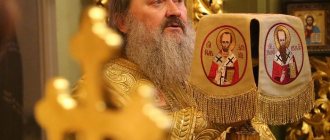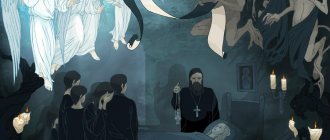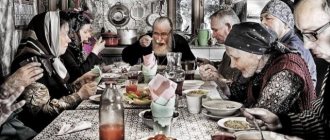Death in Christianity
The topic of death and “other” life is unpopular in modern society and is rarely discussed publicly outside the Church. But the older and more conscious a person becomes, the more she needs answers to various questions about posthumous existence. For example, the teaching of Christianity about the afterlife, what happens to the soul after death.
According to Orthodox doctrine, every person has a soul - an immaterial and immortal spiritual essence. It was created by God and given to man at the moment of his birth in his mother’s womb. Man is a mysterious union of soul and body conceived by God. Saint Gregory of Nyssa compared the soul to a mirror, which in a pure state can reflect the Divine image. What happens to a soul mired in sins? She can no longer display the image of God and turns into the likeness of a demon in her condition.
Orthodox tombstone crosses
Physical death in Orthodoxy is not a dead end, but birth into a new life. Saint Ignatius (Brianchaninov) in “The Tale of Death” wrote:
“Death is a great mystery. She is the birth of a person from earthly, temporary life into eternity.”
After the death of the body, the soul continues to exist in the spiritual world. Righteous souls abide with God, while sinners are under the power of dark forces. The salvation of the soul, that is, cleansing it from sin, preparing for the transition to a new life, is the meaning of Christian life. The view of death as a great transition to a new life is reflected in the church tradition of the main commemoration of saints precisely on the day of their death, and not their earthly birth.
How was Christ's death different from the death of any other person?
The death of Jesus Christ was different from the death of ordinary people in purpose, significance and consequences.
The Lord Jesus Christ accepted His death freely and consciously for the salvation of man. This was the main purpose of His suffering and death on the Cross (John 3:16).
The significance of Christ's death corresponded to the height of its purpose. Through His suffering and death, the Redemption of man was accomplished, the consequences of which were: victory over hell; victory over the devil; trampling upon death through the Resurrection; reconciliation of man with God; glorification of human nature in Christ; teaching people an exemplary example of obedience to God and holiness; demonstration of God's love for people; creation of the Church, etc.
What happens to the soul after death
According to Church Tradition, during the first three days the soul is free after death. She can stay near a dead body or visit earthly places dear to her. From the third to the ninth day, the soul contemplates the heavenly abode and touches the joy of eternal life with God. From the ninth to the fortieth day, the soul is shown an afterlife far from God - hellish torment. Between these intervals the soul appears before God. On the fortieth day, the soul again worships God and a preliminary private judgment takes place. It determines the place of residence of the soul until the general Last Judgment.
Where the soul goes after death depends on the spiritual state in which it entered the afterlife. One of the stages of private judgment is the passage of the soul through ordeals (tests). The source of church teaching on ordeals is the revelations of the Holy Fathers. The trials are first mentioned in the “Life of St. Basil the New” of the 5th century. The ordeals show how different passions are rooted in the soul.
There are twenty ordeals in total. Each corresponds to one of the main sinful passions: pride, gluttony, fornication, and so on. The more passions a soul has and the stronger they are, the more difficult it is for angels to protect it from demons. Righteous souls, united with Christ in earthly life, go through ordeals quickly and unhindered. Demons have no power over them.
Freedom of choice is given to us only in earthly life. The soul is able to repent only when it is in the body. After separation from the body, depending on its state, it unites either with God or with dark spirits. The Monk Isaac the Syrian in “Words of the Ascetic” expounds the idea that sinners, even after death, are not deprived of Divine love. However, this love causes them suffering. After all, during his lifetime the sinner did not learn to perceive it and move towards God.
Therefore, for a righteous person being with God is consolation and joy, but for a sinner it is unbearable torment. Consequently, it will be even more painful for him in heaven than in hell. Therefore, hell is often seen as a place of God's special mercy towards sinners.
Orthodox Life
Should you be afraid of death? Why is illness always the moment of God’s visit? And how do trials teach sincere prayer? The cleric of the church in honor of the icon of the Mother of God “Joy of All Who Sorrow” and the Venerable Genevieve of the Paris Korsun Diocese of the Russian Orthodox Church, a nurse at a hospital in Paris, Priest Nikolai Tikhonchuk answers.
– Today people have become especially afraid of death - because they suddenly started talking about it loudly against the backdrop of a pandemic. And this also affected the believers... How can you, as a priest and nurse, console people from these panic-inducing thoughts?
– Death is an incomprehensible mystery for us and it is scary because there is uncertainty behind it. We were brought up this way: we are the last sinners, and even if we repent, the strict Judgment of God still awaits us. With such thoughts we drive ourselves into a dead end, from which it is difficult to get out and see God not only as a Judge, but also the One who wants to be with us, who, in fact, does not want to part with us, but to be in communication, to share the joy of being . This is how it is on the icon of the Holy Trinity by Andrei Rublev: God the Trinity sits at the table, and at this table, as you know, there is always a free place for you, for me and for each of us. He invites us to share with Him the common Cup of faith and life. That is why he became a Man and shared this path with people. Sometimes this perception of God is lost, but He loves us and wants us to have life and have it more abundantly. Therefore, trying to see God as a loving Father is important.
He died for us on the cross out of love. We remember the robber who sincerely and simply said just one phrase, and the Lord led him into heaven. God does not require much from a person, it seems to me. Faith is the main thing God looks for in us. Faith in God, who has risen and is ready to lead us into eternal life. After all, the whole faith of the apostolic centuries is faith not in the Terrible Judge, but in the risen God, who gives hope and who inspires us to life and not to death. The whole Good News is built on this.
Orthodox worship is built on the theme of resurrection in Christ and salvation. And we say that there is no death, because it is destroyed. This dimension of the Christian faith somehow over time took a less important place in the lives of believers than in the first centuries. But this is the basis of our hope – the risen Christ. And if we do not believe in the risen Christ, our faith is in vain. He destroyed hell and gives us hope of eternal life.
It is this kind of faith that we often lack, and we plunge into the pagan element of fear of death. Such things should not be close to us. If death frightens us, let us remember the risen Christ. Let us remember the beautiful icon of the Descent into Hell, where the Savior holds Adam and Eve by the hands, and in their person literally takes all of humanity out of this mortal darkness and melancholy. This is why He came - so that no one would remain in destruction. It seems to me that it is with such faith and hope that one should look at death. Death is sad. She is full of tears. In it we part with our loved ones. But we believe that this separation will be overcome in Christ.
– You have seen death more than once, including in intensive care. How did you personally experience this? What thoughts came to you at such moments?
– I remember one story. One woman had a rare disease that caused gradual atrophy of the muscles that make our chest move and allow us to breathe. The patient was dying in my arms. She faded away gradually. For two months I was with her all the time. She remained in my memory because she was absolutely unbelieving. She found herself in front of the priest in my person (but did not know about this, since I was in front of her as a nurse). I thought: maybe I should talk to her about Christ, pray next to her? And then I decided that it was not worth taking advantage of a person’s weakness, because this could cause different reactions, rejection for example. A person must have a free desire to turn to God.
How can we help a person in his last part of life find support, faith, and find Christ? How to give hope and joy? And I still don't have an answer. And I don't know if I did the right thing. When she began to choke, it didn’t hurt her because she had painkillers, but it’s still not very pleasant: a person gasps for air and gradually stops breathing. Like a fish thrown ashore... I took her hand and silently read a prayer. We looked into each other's eyes, quite calmly. I wanted to accompany her on her final journey and entrust her soul into the hands of God, so that the Lord would accept her. I don’t know why this happened and why we met. But God trusts us, Christians, to testify about Him in this world. He wants us to be like Him, with those people who suffer. And so I found myself next to such people in the hospital, because they got sick, and I - because I work here as a nurse. Being close to a dying person is an opportunity for me to pray for him, to simply be there. Simply being-existing for another is already service.
– Why did the holy fathers call illness the moment of God’s visit? After all, if you think about it, when you are sick, all your thoughts are around the illness, and it can be difficult to concentrate on the spiritual.
“The greater the sorrow, the closer God is,” there is a saying. Probably because in any suffering we become like Christ. Once I was on duty on the night shift in intensive care. There was a man lying there, sick with Covid. I literally felt that the patient in front of me was like Christ on the cross. I see him lying with his arms outstretched, through which he is connected to all life support systems. Nearby there is a machine for filtering blood, a ventilator... He was literally crucified by his illness. Outwardly, he looked like a suffering, dying Christ on the cross.
It seems to me that the Lord allows a person in illness to bear His cross, to draw closer to Him in suffering. I don’t know why, but this is the secret of our salvation. There is a mysterious communion with Christ in this. This is how we can try to understand and accept the trials that befall us.
– How should the person himself or herself deal with a serious illness or if a loved one is seriously ill? Sometimes a Christian grumbles: why, Lord? Indeed, we are looking for protection in God, but life is already full of difficulties, and illness is always a heavy blow.
– The disease knocks us out of our usual rut. And we are completely at a loss, because the usual course of events is simply collapsing. This is probably sent by God in order to somehow encourage us to live, real prayer and sincere communication with the Lord. Often, even in liturgical prayer practice, we are satisfied with the external form, we are carried away by the external. I'm talking about myself, first of all. Yes, I pray, but God expects me to give Him my heart, in which the seeds of true faith can grow. And this can only happen because we enter into genuine communication with Him. Sometimes it happens to us in the experience of illness. Praying when things are not so bad in your life is simple. But when you feel on the verge of some problem, prayer is completely different. I think that this feeling of prayer is familiar to many from personal experience. The disease can be compared to stretched guitar strings. When they are not tight, a clear sound is not produced and the instrument does not sound. And when all our feelings are in tension, in illness, for example, then they do not sound false, but authentic and sincere. This is probably what God wants: for us, while going through trials, to learn to enter into genuine communication with Him.
The Kingdom of God comes precisely when we act and act as He would act and act in our place. And only then will every Christian be able to boldly and boldly say after the Apostle Paul: “And it is no longer I who live, but Christ lives in me. And while I live on earth, I live thanks to faith in the Son of God, who loved me and gave himself as a sacrifice for me.” (Gal 2:20)
Interviewed by Vladimir Basenkov
Christianity: The Most Underrated Religion of Our Time
Writing about Christianity and Orthodoxy in our time is difficult. There is probably no religion on earth that is entangled in so many conjectures and prejudices.
Our time itself is to blame for this, as it has turned half the concepts about life upside down. Cultural aspects of a particular country are also to blame. As a result, the very words and terms by which Orthodoxy lives have lost their original deep meaning.
- Prayer - this mystical communication with God of the soul - has become confused with emotions.
- Repentance (that is, the desire to live in a new way) - with soul-searching.
- Sin - with legal misconduct.
- Humility comes with downtroddenness.
- Christ - with man.
Perhaps I am only speaking from my own experience, but growing up in a church school in the 90s, I (and I believe I was not the only one) heard only one thing about Christ: He walked the earth and was crucified.
The idea of Christ the God was completely suppressed by the idea of Christ the man. Christ in the culture and in the minds of many people has shrunk from God to nothing but a saint. Very charismatic, spiritually strong, the greatest of the greats, but still a saint.
The excessive “humanization” of Christ is a big problem. And the problem is so underestimated that now, probably, not even everyone understands what we are talking about now and what, in fact, the problem is.
You will say - I know that Christ is the Son of God. You will also say - of course, Christ is our true God.
But it seems that this will be exactly the same knowledge as our knowledge of death. We all know that we will die, but we have not “recognized” this thought - it has not become part of our nature.
What is this - Christ God?
- Christ is the Source of Life.
- Christ began before all.
- Christ is God.
- Christ is our breath.
- Christ is our desire.
- Christ is the action of life within us.
- Christ is our Love.
- Christ is the hope of our spirit.
- Christ is our immortality.
- Christ is all that is eternal that is within us.
- Christ is the most important thing that is within us.
- Christ is the most hidden thing in our existence.
- Christ is our hope.
If it were not for the action of Christ in us, we would, as Gregory Palamas said in one of his sermons, would have disintegrated instantly before the action of death in our world.
The fact that we are alive is Christ. And the Nativity of Christ on Earth is the greatest Mystery that has occurred since the creation of the world and the fall of man from eternal life.
God became human. So that by his coming - by his clothing in human flesh, by his suffering on the cross - he would return us to Eternal Life. Or at least give us a full chance at it.











